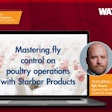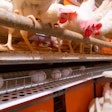Elizabeth Doughman, editor, WATT PoultryUSA and Poultry Future: Hello and welcome to WATT Poultry Chat. I'm Elizabeth Doughman, the editor of WATT PoultryUSA and Poultry Future.
This Watt Poultry Chat is brought to you by Elanco. Elanco Animal Health Incorporated is a global leader in animal health dedicated to innovating and delivering products and services to prevent and treat disease in farm animals and pets, creating value for farmers, pet owners, veterinarians, stakeholders and society as a whole.
With nearly 70 years of animal health heritage, Elanco is committed to helping customers improve the health of animals in their care, while also making a meaningful impact on local and global communities. Elanco is driven by its vision of Food and Companionship Enriching Life and Elanco Healthy Purpose – all to advance the health of animals, people, the planet and enterprise. Learn more at www.elanco.com.
Joining us today is Bill Potter, Ph.D, food safety technical advisor at Elanco.
Thanks for joining us, Bill.
What are the benefits and industry implications of Salmonella vaccines?
Bill Potter, Ph.D, food safety technical advisor at Elanco: We have a good long history in the poultry industry of using Salmonella vaccines in breeding stock and layers, even meat broilers and turkeys, to stimulate immunity and overall reduce shedding from the birds of Salmonella’s various serotypes. Obviously, the implications of that are a reduced burden to the processing plants for some of these particularly harmful serotypes that vaccines address and, ultimately, a reduction of risk of Salmonellosis to the human population.
It's a good technology to help from the farm to plant to consumer continuum.
Doughman: Has there been any new data collected or other information demonstrating the effectiveness of Salmonella vaccines?
Potter: For years, we've seen the effectiveness of these vaccines and particularly in reducing serotypes of concern that the vaccines are targeted to address.
Of late, there's been a lot of looking at not only the targeted serotypes of concern, for example, in a Typhimurium vaccine. Historically, we'd look at the reduction of Typhimurium or something like Enteritidis or Heidelberg which has conserved similar somatic and fluid flagellar antigens.
Now researchers are looking at more cross protection. Of course, Infantis is the big stereotype of concern that has been on the rise in recent years. For example, the U.S. Department of Agriculture (USDA) did a research study that was just recently published that looked at the impact of a Typhimurium vaccine on cross protection in the ceca and in the other internal organs of turkeys. They were able to see some reduction in those tissues as well, particularly the cecum.
In the industry, the big thing is now that integrators are trying to understand not just from vaccines, but from all of their preharvest interventions, what's the impact on quantitative load either at the farm or at the plant? So those are all some of the new things that are being looked at pretty strongly.
Doughman: How does the Salmonella framework impact the way vaccines are viewed by the industry, such as veterinarians, plant managers and food safety leaders?
Potter: We believe the framework will have a combination of components. It certainly has not been published as of the date of this interview, but there will be some emphasis on preharvest which could possibly be voluntary or suggested, as well as increased controls in processing and then in finished product standards.
It seems that the emphasis on reduction of certain serotypes of concern and/or quantitative loads in finished products will have an effect all the way back to the lab operations preharvest, because one of the ways we know that we can affect particularly serotypes of concern is with targeted vaccines.
Collectively, although it not might be a finished product standard, one of the best ways to address that could inevitably possibly be increased implementation of vaccines or maybe optimization of them.
Doughman: How can poultry integrators most efficiently adapt to these regulatory changes?
Potter: The most effective way to address any regulatory change, and particularly when you're talking about something complicated like microbial reduction, is always going to be through the team approach.
Rather than counting on one subject matter expert to go in and try to tell you how to fix it, it will always be best addressed with a combination of experts helping with the problem. That might be veterinarians. It might be lab production staff. Certainly plant operations and food safety and quality assurance people all play a role. But expanding that from the farm all the way through processing through a team approach is what we're seeing works the most. Data collection is certainly a key part of that as well.
Doughman: Thank you so much for sharing these insights. For more information on the solutions discussed here today, visit Elanco Animal Health at www.elanco.com.
Thanks again, Bill, and thanks to you for tuning in.

















